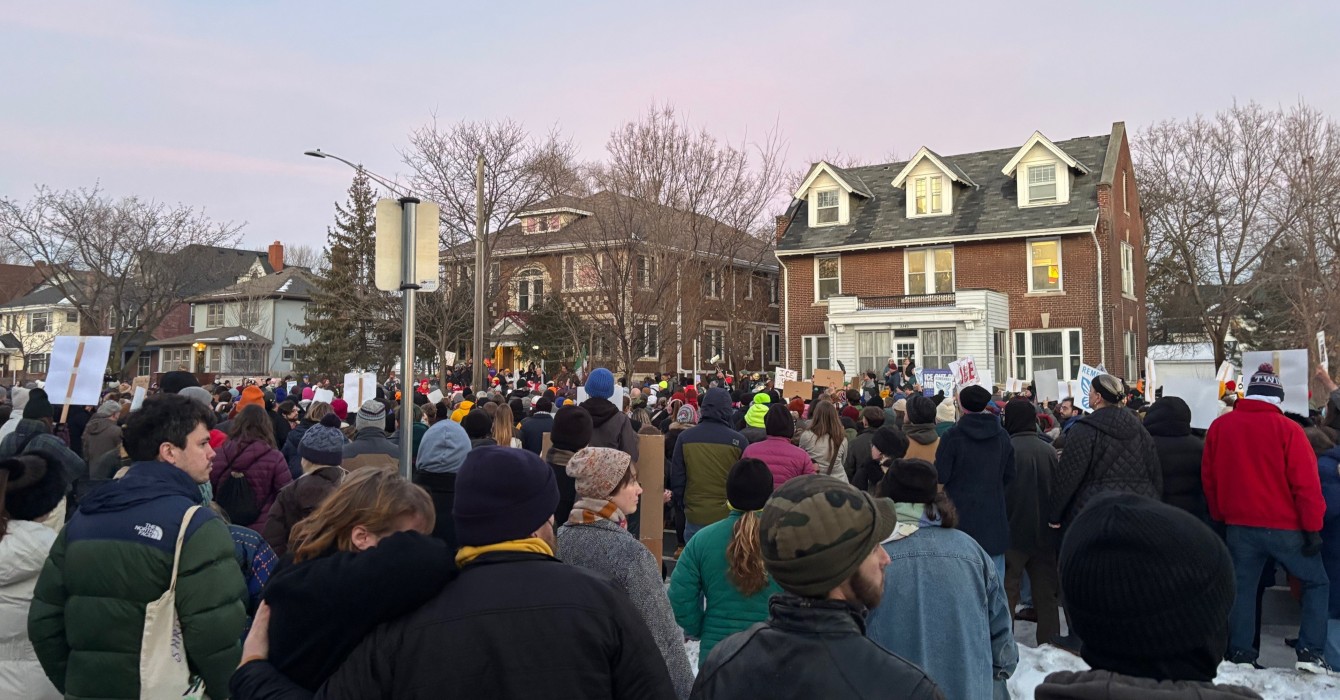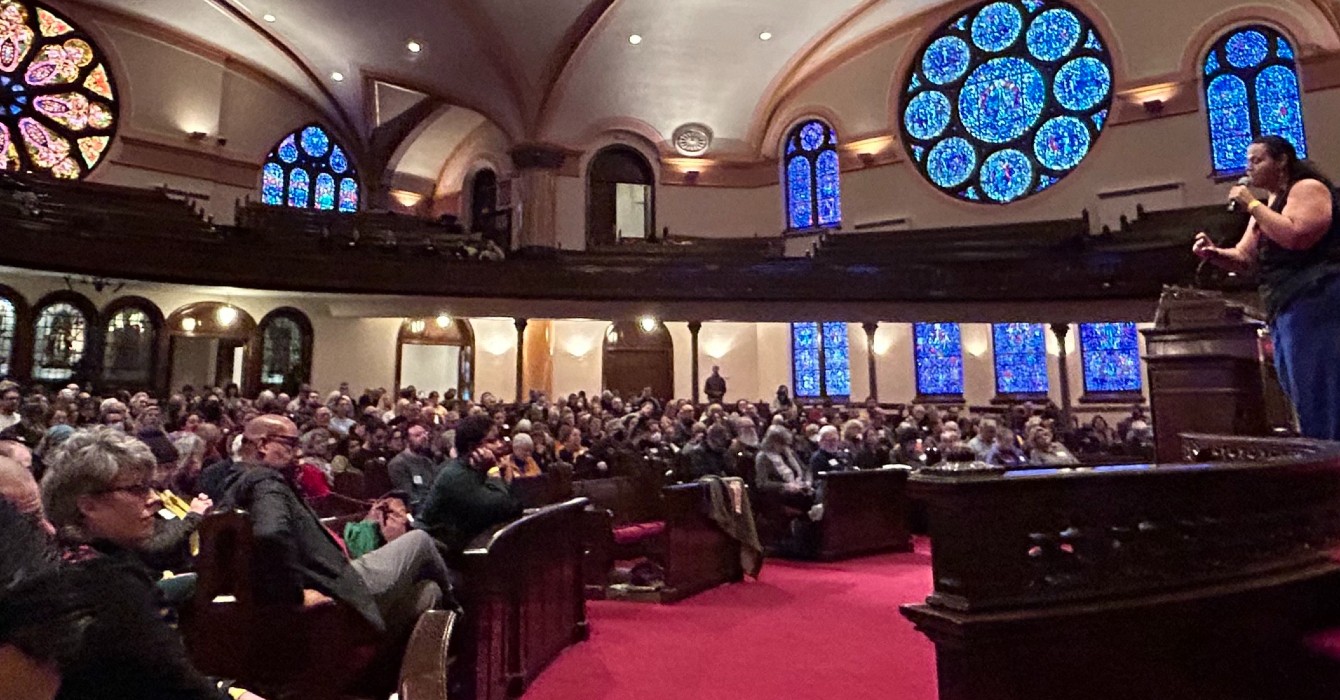Ten students from Fordham University visiting an industrial cooperative in the heart of North Carolina’s textile capital sat down in a hulking warehouse recently to learn how to sew a tote bag.
First, they selected one of a variety of recycled fabrics, laid it over a printed pattern and cut out the shapes. Then they got a crash course on the parts of a sewing machine: the bobbin, the presser foot, the needle plate.
Finally, they sewed the pieces together. The hardest part, the students agreed, was folding the long straps in on themselves and then sewing them to the bag.
“A lot of us were struggling just to keep up,” said Emma Lipkind, a junior majoring in French and international political economy. “It was very, very challenging.”
The exercise, intended to help students appreciate the work of skilled labor and learn about cooperatives, was part of a weeklong immersive course that Fordham, a Catholic school in New York City, offers its students.
The Jesuit school upholds values of alleviating poverty and promoting justice. Those values are also at the heart of The Industrial Commons, a unique experiment unfolding in Morganton, North Carolina. The Commons incubates employee-owned cooperatives as a way of building a more equitable economy in this city of 16,000 at the foot of the Blue Ridge Mountains, about 54 miles east of Asheville.

The Industrial Commons among 2021 winners
Leadership Education at Duke Divinity recognizes institutions that act creatively in the face of challenges while remaining faithful to their mission and convictions. Winners receive $10,000 to continue their work.
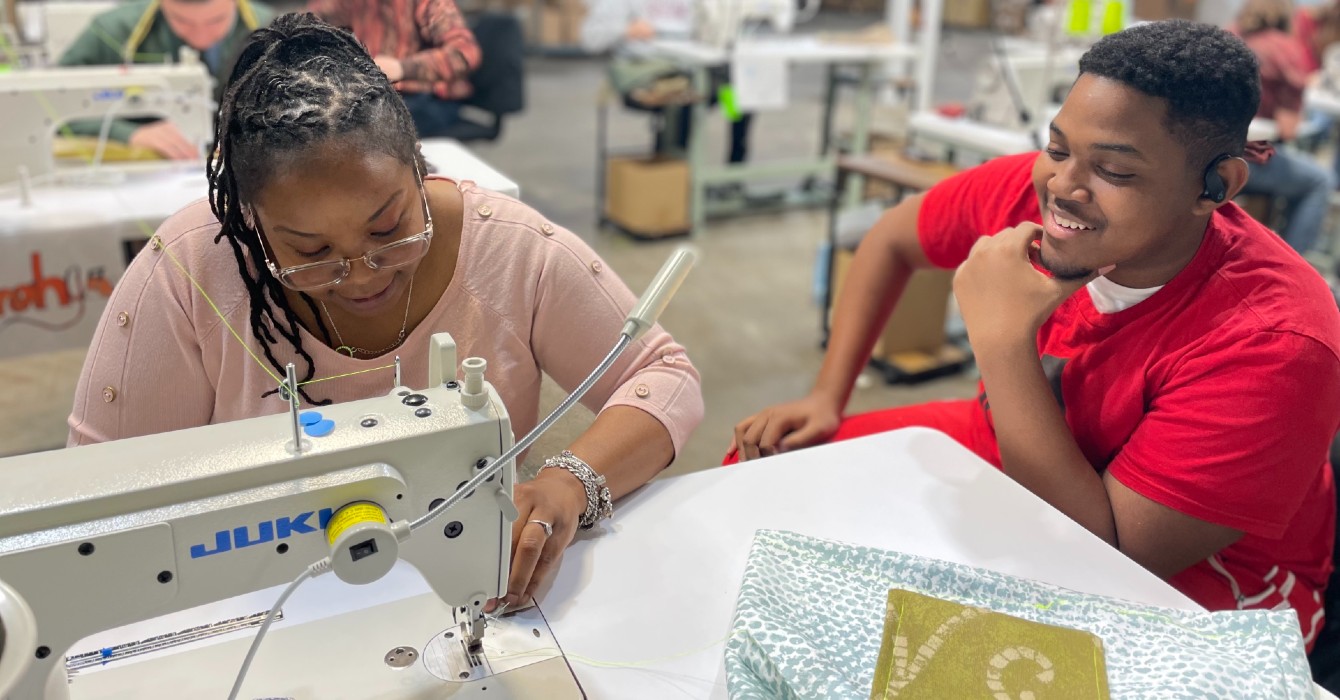
Among the cooperatives it has birthed: a network of textile manufacturers with a brand of clothing and bags called Collection, a company that recycles millions of pounds of textile waste, and a minority-owned, women-led bookkeeping service. (Another cooperative is now in the planning stages.)
Since its founding in 2015, The Industrial Commons has hired 27 people in Morganton who work out of a corner of a 180,000-square-foot former shoe manufacturing plant. Their annual revenue last year was $473,000.
Workers at the organization earn hourly wages of between $15 and $38. They are all owners of the companies they work for, sharing in the decision making as well as the profits. Like all businesses, they strive to be profitable, but their main goal is preserving jobs, so they tend to invest in the workers and the larger community rather than prioritizing the owners or the shareholders.
And though neither of the two founders of The Industrial Commons is Catholic (one is Episcopalian; the other, Presbyterian), their work is informed by Catholic social teachings of solidarity and subsidiarity. That is, they seek to position themselves on the side of the poor and the marginalized and give workers as much control over their lives as possible.
In doing so, they are trying to offer an alternative to the typical top-down business, where company profits and high executive pay concentrate wealth in the hands of a few, often trampling over workers in the process. In the United States, the chief executives of the largest 350 companies are paid about 350 times as much as the typical worker, according to the Economic Policy Institute in Washington. By contrast, no executive at the Morganton cooperatives will ever earn more than four times the salary of the lowest-paid worker.
How do its fundamental values ground the work of The Industrial Commons?
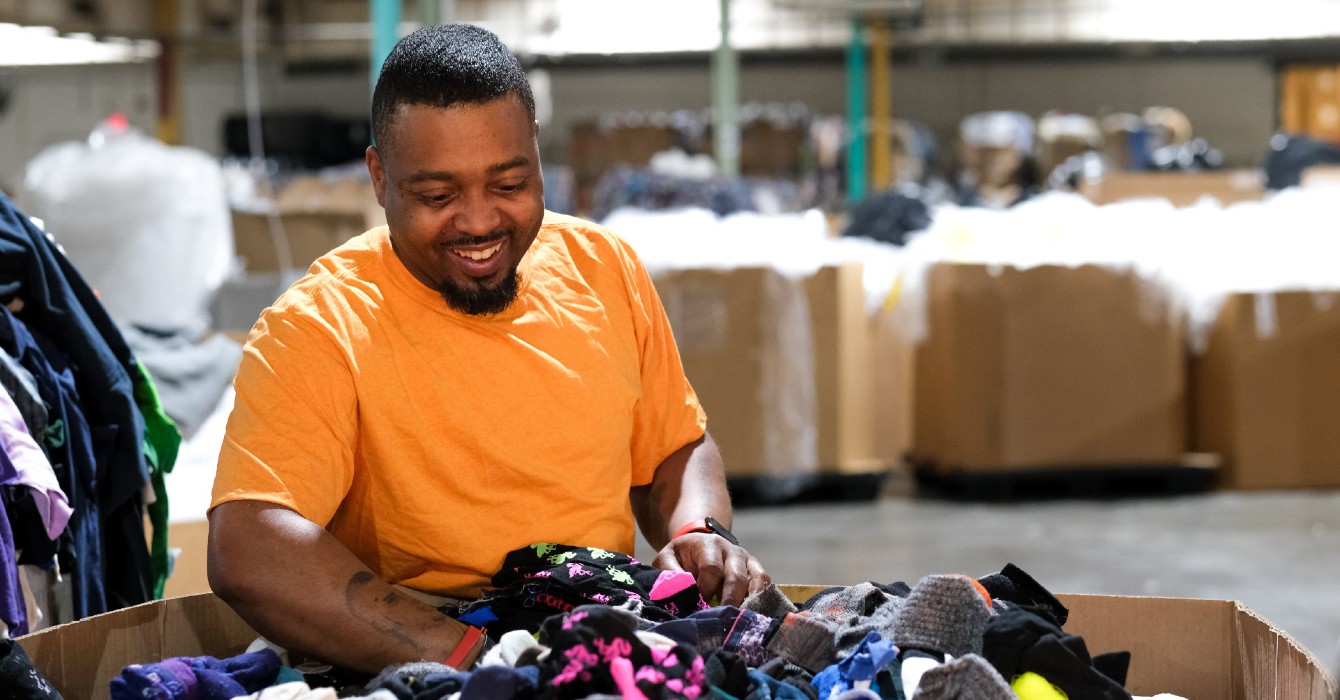
That impressed Nathaniel Medina, a senior finance major at Fordham who has a job lined up at an investment bank when he graduates next month.
“It’s shown me that you can breed a sense of collectivism through businesses,” Medina said. “I never thought that was possible.”
A labor crisis
Molly Hemstreet remembers lying in bed at night as a child in the 1980s and hearing the horns that signaled a shift change at one of Morganton’s many mills. She remembers thinking, “People in my town are working at all hours of the day.”
In those days, 45% of Burke County residents worked in manufacturing or production — furniture, hosiery, textiles, poultry farms. Many of them were immigrants. In the 1970s and early ’80s, about 500 Laotian Hmong refugees from the Vietnam War settled in Morganton. By the 1990s, the town was booming with indigenous Maya from Guatemala. Between 1990 and 2000, the county’s population of Spanish-speaking people mushroomed from 344 to 3,180.
It’s one reason Hemstreet, who attended Grace Episcopal Church growing up, chose Spanish and Latin American studies as her major at Duke University. After college, she traveled to Central America and worked for Heifer International, a nonprofit that helps poor people become self-sufficient through animal husbandry or agriculture.
By the time she returned to Morganton to teach in its public schools, labor issues had reached a breaking point. A few years earlier, three Guatemalans at Case Farms, the local poultry plant, had walked out in frustration over unfair pay, lack of bathroom breaks and other issues. They were promptly fired. The workers who remained hired lawyers and huddled at Morganton’s only Catholic church, St. Charles Borromeo, where they decided to form a union.
Case Farms fought the union election, appealed the results and refused to sign a contract, and the union was eventually decertified.
By then, Hemstreet and her Chilean-born Catholic husband, Francisco Risso, were running a Catholic worker house, offering destitute people a place to stay. They began wondering, “Is there a better way to do things? How can we pool our resources and lift everyone up?”
In what ways do these leaders and workers embody Christ’s resurrected life in the hope their actions engender?
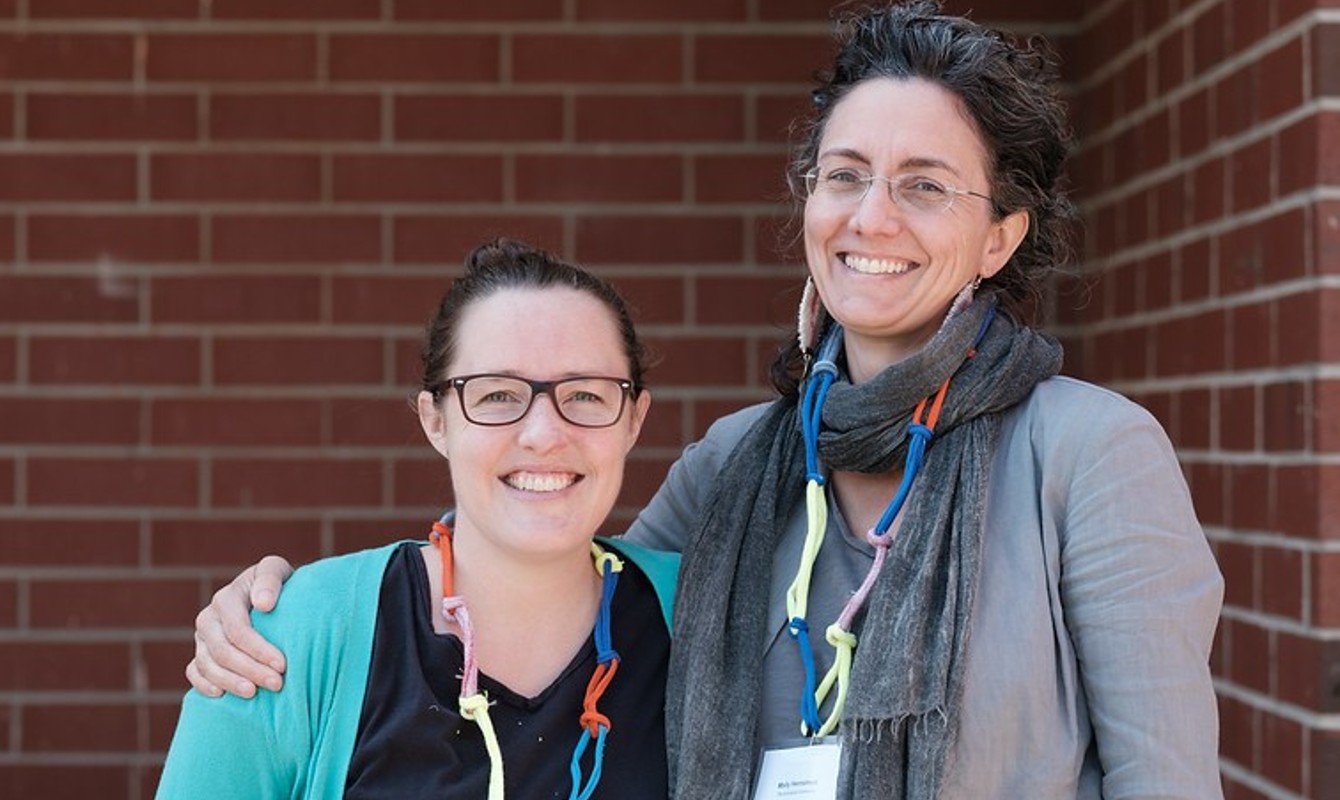
Then came the offshoring. By the early 2000s, large-scale textile and furniture manufacturers, few of them locally owned, moved production overseas, where they could pay workers even less. Overnight, factories emptied of workers. From a height of 80,000 people working in manufacturing in the Hickory-Morganton-Lenoir metropolitan statistical area during the 1990s, there are now about 40,000, according to the U.S. Census.
In 2008, Hemstreet hit on an economic solution. Alongside a group of skilled Guatemalan sewers, she founded a worker-owned, small-batch cut-and-sew cooperative. Opportunity Threads now employs 70 people, most of them Mayan or children of immigrant Mayans. One of their biggest contracts is Project Repat, which makes custom quilts from old T-shirts.
“There’s an incredible amount of knowledge around textile production here,” she said. “We have experts that can help guide us. We’re very well positioned to help revitalize the business.”
Hemstreet and Risso moved out of the Catholic worker house after their two children were born. But Hemstreet’s commitment to the idea of the cooperative only grew. (Risso now works as a hospital chaplain.)
A few years later, she met her entrepreneurial partner, Sara Chester, a Morganton native who had worked in the county’s economic development organization.
Chester had moved back to Morganton in 2012 after graduating from the University of North Carolina at Chapel Hill. She noticed that many of her peers — young people who had graduated from college — were not moving back, because their hometown couldn’t offer them jobs to match their education.
Manufacturers that remained in town, she also learned, complained that they couldn’t find young workers. Most workers in manufacturing were in their 50s.
In 2015, Chester and Hemstreet founded The Industrial Commons, a nonprofit that supports new worker-owned businesses with grants, loans, and workforce development and training.
Over the years, it has won major grants from The Rockefeller Foundation and the Appalachian Regional Commission. Its work has also been supported by $1.5 million in grants from the Catholic Campaign for Human Development, the anti-poverty and social justice program of the United States Conference of Catholic Bishops.
When the pandemic hit, the three cooperatives decided to pivot and produce masks, gowns and other PPE essentials. They stayed afloat — and productive — sewing some 800,000 items.
There are many turning points in this unfolding story of solidarity economics in a rural, southern community. Which ones strike you the most?
A good neighbor
For Hemstreet and Chester, it’s all about place. Their No. 1 priority is to be a good neighbor to the people of Morganton — both its longtime, established residents and its newly arrived immigrants.
One of those neighbors is Bob Carswell, a 35-year-old Morganton native who runs Material Return, a cooperative that collects textile waste from across the region, processes it, spins it into yarn and turns it back into fabric that can be used for new products.
Carswell’s family has worked in manufacturing for four generations. He started working in a furniture factory, sweeping floors and packing boxes for $7 an hour, as soon as he finished high school. He eventually worked his way up to cutting upholstery and then producing computer-assisted drawings. But that was as far as he could go.
“There was no room for growth,” he said. “You just put your head down and work.”
The Industrial Commons has developed key partnerships as it has grown. Who are your partners along the way?
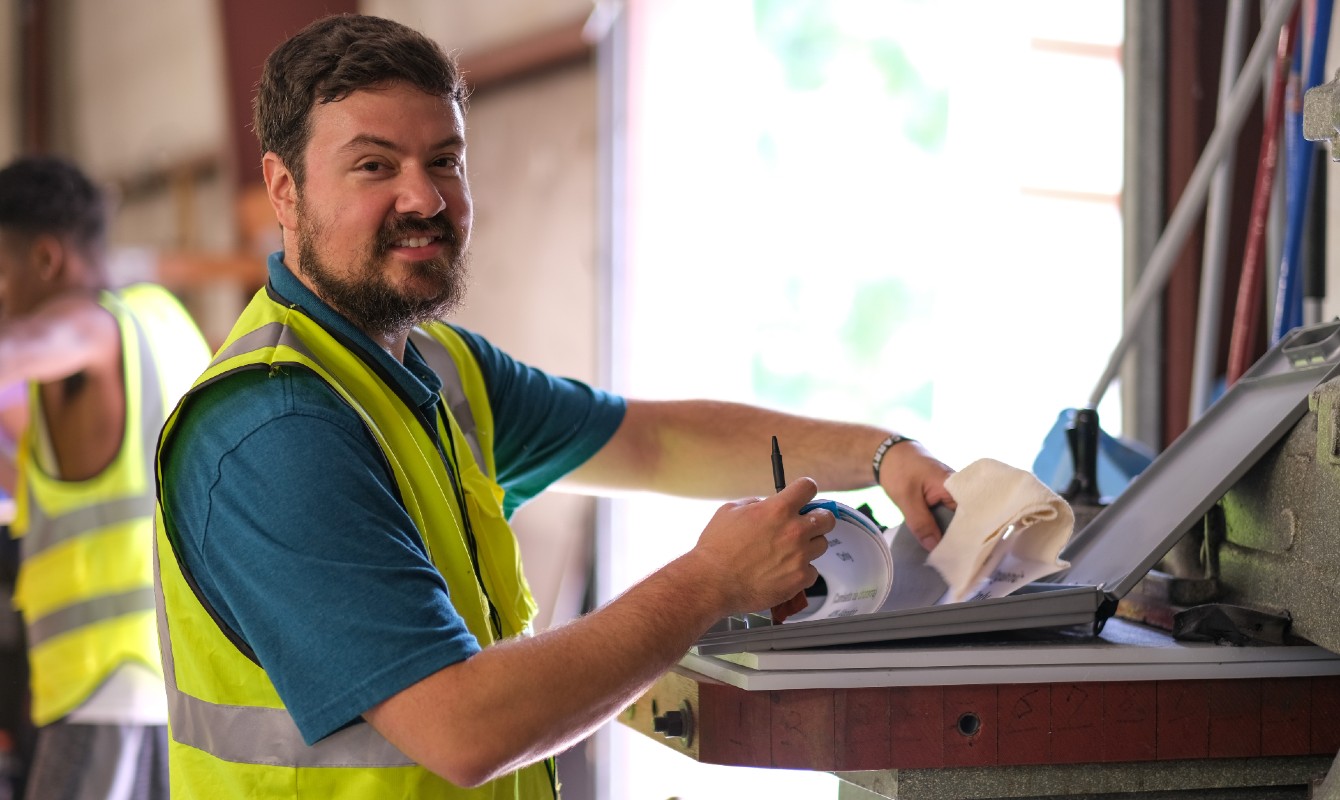
After earning two associate degrees in engineering, he ran into Chester one day at the local community college. They began talking, and in 2019, he quit his job at the furniture company and began running Material Return. His first task was to map out regional companies with textile waste. In its second year of operation, the startup won a contract with Smartwool, the Colorado-based maker of merino wool apparel, to recycle socks. The company has a goal of 30% recycled yarn in its socks.
Material Return now works with 26 manufacturers collecting textile waste it can either “downstream” (turn into insulation for cars or appliances or furniture) or “upstream” (re-spin into new woven fabrics).
“The reason I’m so engrossed in this career is because being able to create a place where you have agency and decision making and equity is completely different than the old way,” Carswell said. “It was a job before. This is a career.”
The Industrial Commons also hired Sharley Mendoza, a native of Guatemala who came to the United States with her family when she was 4. Mendoza, who is 25, runs Good Books, a women-led cooperative that provides bilingual bookkeeping services to businesses of all sizes.
Mendoza is protected by DACA, the Deferred Action for Childhood Arrivals program, and can work legally. She graduated from high school with a 4.3 grade-point average and was intent on going to college. But North Carolina state universities charge noncitizens out-of-state tuition, which for her was prohibitive.
The Industrial Commons paid for her to take some accounting classes at Western Piedmont Community College as she started her job. Good Books now has three employees and manages the books for 20 clients, offering a fee schedule on a sliding scale as well as Spanish translation services.
Her benefits include paid vacation, medical and dental insurance, maternity leave, access to management training and, over time, annual profit sharing. She said she wants to stay until she retires.
“There’s a strong sense of wanting to improve the community — loving your neighbor,” Mendoza said. “We want people to coexist and be able to help each other out.”
A gospel concept
If Morganton’s labor issues have a support base, it’s been St. Charles Borromeo Catholic Church.
The modest sanctuary accented by sloping wooden beams is the place where Guatemalan workers at Case Farms conceived and planned a union back in the ’90s. It is still the church home to many Guatemalans today. Of the 700 families that worship there, about 85% are Spanish-speaking. Nearly all the workers at Opportunity Threads worship there.
One reason the church has been a force in the town is its priest, the Rev. Ken Whittington. Whittington has led the church since 1992 and over the years has become an ally and champion of the workers. At 81, he still celebrates as many as five Masses each weekend, including one in Spanish and one in Hmong.
Whittington said Catholic social teachings about economic justice are not well-understood among members of his parish.
“If you ask most people in this congregation what Catholic social teaching is, they’ll say ‘abortion,’” Whittington said, referring to the church’s strong opposition to the practice.
Still, the idea of “the collective,” he said, “inspires them.”
Perhaps it’s just ingrained in their Catholic heritage. Historians trace the church’s labor stance to “Rerum Novarum” (or “Rights and Duties of Capital and Labor”), an encyclical issued by Pope Leo XIII in 1891, which argued that free market forces must be tempered by moral considerations. Pointing to God’s compassion for the poor, the teaching supported workers’ rights to unions and collective bargaining.
In 1919, the “Bishops’ Program of Social Reconstruction,” published by an early predecessor of the United States Conference of Catholic Bishops, expressed an interest in cooperatives, saying, “The full possibilities of increased production will not be realized so long as the majority of workers remain mere wage earners. The majority must somehow become owners, at least in part, of the instruments of production.”
In 1956, a priest named José María Arizmendiarrieta and a group of his students at a technical college founded a cooperative that produced paraffin heaters in the town of Mondragon, in Spain’s Basque Country.
It has since evolved into 96 separate, self-governing cooperatives, employing nearly 80,000 people. They produce a variety of goods, including sliding doors, plastic parts used in cars, and medical devices, and also run retail groups, such as a major grocery chain. The companies have annual revenues of more than 12 billion euros ($14.5 billion). At Mondragon, executive salaries are capped at six times the lowest wage.
Hemstreet and Chester frequently refer to Mondragon as proof of concept.
“You can make a good profit and be a strong, resilient, financially successful company and at the same time support workers, pay them living wages, make sure they have a voice, and do business in a way that prioritizes environmental sustainability,” Chester said.
What role do faith and the church play in this story?

For Hemstreet, it’s fundamentally a gospel concept. She loves the story of the feeding of the 5,000, in which Jesus used five loaves of bread and two fish to feed a multitude.
“What’s so remarkable in that story is that the community realized enough was there. There was even [some] left over. When they pool their resources, there’s enough.”
Nurturing future generations
With the help of an anonymous donor, The Industrial Commons recently bought a 30-acre brownfield site in the center of town where a furniture factory once stood. They plan to move their operations there and develop 40 units of cooperative housing nearby.
In the meantime, they are trying to spread the word about cooperatives to students, often from Catholic colleges. In addition to the Fordham group, students from John Carroll, a Jesuit university in Ohio, visited recently.
Education is a core value of The Industrial Commons, which strives to nurture the idea of cooperatives in future generations even before they reach the workplace. To that end, it has partnered with the Ignatian Solidarity Network and the Catholic Campaign for Human Development to bring students to Morganton so they can see how cooperatives work.
Hemstreet thinks young people get it.
“It’s more in their lexicon, in their ethos of what it means to be young now,” she said, citing such consumer trends as fair trade, labor unions and health care.
It’s certainly made an impression on the Fordham students.
Lipkind, who is interested in journalism and writes for The Fordham Ram, said she’s been Googling cooperatives in New York City, hoping that Fordham or the student groups she’s a part of may want to partner with them.
Medina, the student who will begin working at an investment bank next month, said he loves Hemstreet’s notion of “coopetition” — the idea that companies can cooperate (as the cooperatives do among themselves) and still compete for business.
“It’s just the word I was looking for,” he said. “If you can create an economic system that is focused on being together, it can change the culture.”
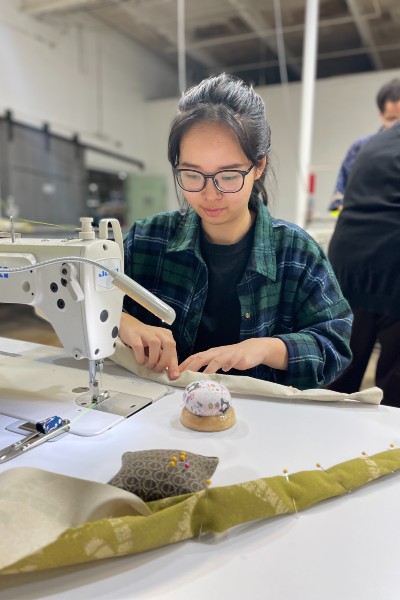
Questions to consider
- How do its fundamental values ground the work of The Industrial Commons?
- In what ways do these leaders and workers embody Christ’s resurrected life in the hope their actions engender?
- There are many turning points in this unfolding story of solidarity economics in a rural, southern community. Which ones strike you the most?
- The Industrial Commons has developed key partnerships as it has grown. Who are your partners along the way?
- What role do faith and the church play in this story?







